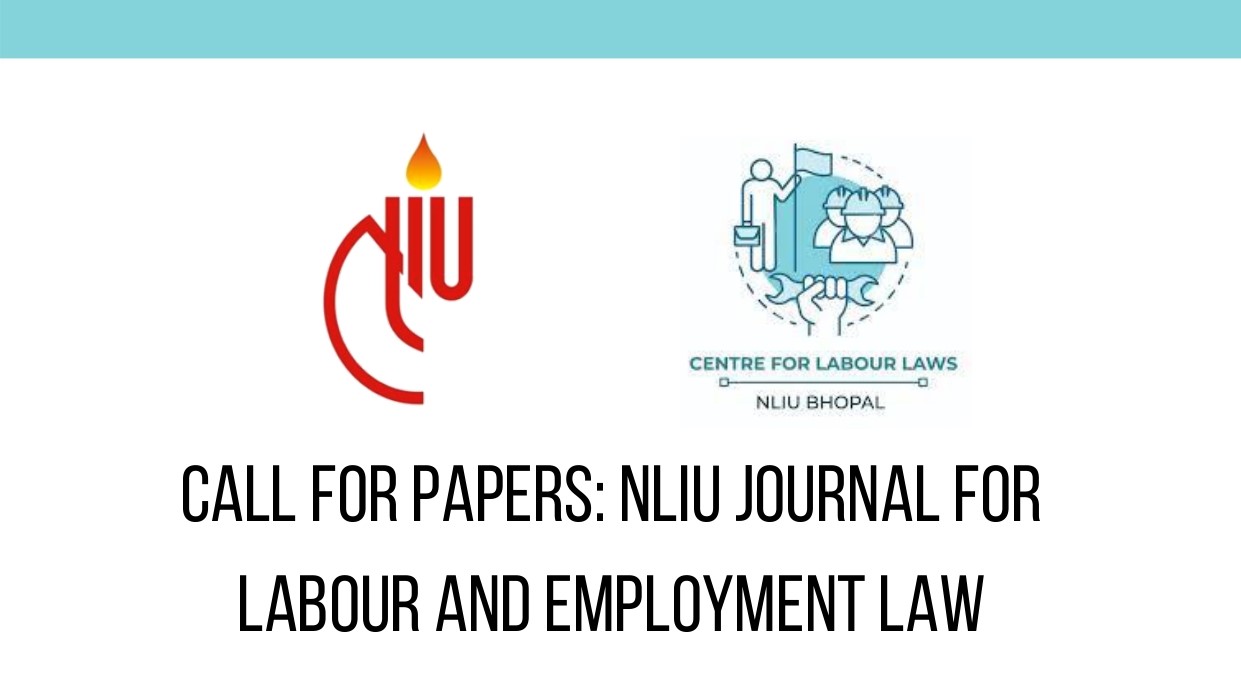Call for Papers: NLIU Journal of Labour and Employment Law (JLEL)
About NLIU Journal of Labour and Employment Law The NLIU-JLEL is a peer-reviewed annual labour and employment law journal which aims to create meaningful debate and discourse to build a fair and equitable regime of workspace laws and to study the dynamic confluence of the academic and the human resource represented by such laws. Theme We welcome original,… Read More »

About NLIU Journal of Labour and Employment Law
The NLIU-JLEL is a peer-reviewed annual labour and employment law journal which aims to create meaningful debate and discourse to build a fair and equitable regime of workspace laws and to study the dynamic confluence of the academic and the human resource represented by such laws.
Theme
We welcome original, genuine and unpublished contributions from students, academicians and practitioners for the Journal. The Journal is accepting submissions under the broad theme of “Labour and Employment Laws” including inter alia industrial disputes, discrimination, gig economy, exploitation, minimum wage, restraint of trade, and whistleblowing. However, the submissions must be of contemporary relevance.
Categories of Submissions
The submission can be made under any of the following categories:
- Articles (4000 to 8000 words)
The article must be a comprehensive and in-depth analysis of the problem(s) or idea(s) dealt with by the author and should include references to a range of sources and contributions in the form of alternatives and suggestions.
- Essays (2000 to 4000 words)
The essay must be an analysis of the problem(s) or idea(s) dealt with by the author and should include references to a range of sources and contributions in the form of alternatives and suggestions.
- Case Comment (2000 to 5000 words)
The comment must be a critical analysis of a recent judgement, bringing out its relevance in light of development of laws, view expressed in the judgement and views of the author(s).
- Book Review (1000 to 3000 words)
The review must be a crisp account of a recently published book including the issues explored and the related arguments of the author.
- Legislative Comment (2000 to 4000 words)
The comment must analyse a recent legislative enactment. It must examine the objective of the legislation and the legal impact the same is expected to have. The word limit is inclusive of footnotes but exclusive of abstract.
Submission Guidelines
- All original submissions must be accompanied by an abstract not exceeding 300 words, which should be included within the document of the manuscript itself. The abstract must expressly include the novelty and usefulness of the idea that the author wishes to put forth and must categorically mention the specific contribution of the submission, beyond the existing available literature, the practical utility of their recommendation.
- All submissions must be in MS Word format (.doc) or (.docx), with Times New Roman font (body: size 12, line spacing: 1.50; footnotes: size 10, line spacing: 1.00).
- The Journal uses only footnotes (and not endnotes) as a method of citation. The footnotes must follow the Oxford Standard for Citation of Legal Authorities (OSCOLA, 4th Edition).
- The submissions must be accompanied by a cover letter with details regarding the name of the author(s), email address, contact number and name and address of the institution, academic qualifications/affiliations of the author(s), title of manuscript.
- The author(s) must provide a declaration of originality with regards to their submission in the body of the email.
- The manuscript itself must not contain any information as to the name(s) of the author(s), the institution, address or any other information that may reveal or indicate their identity.
- Co-authorship is permitted for up to 2 authors. However, co-authorship is not allowed in case of Case Comment, Book Review and Legislative Comment.
- Submissions are accepted for publication on the condition that they do not infringe the copyright or any other rights of any third parties.
- Submissions made should be on an exclusive basis i.e submission should be unpublished and should not be under any concurrent consideration.
- All submissions must be made to jlel.nliu@gmail.com before 23:59 hours, 15th October 2020.
For the complete Call for Papers, Click here
Contact
Email: jlel.nliu@gmail.com
Ph: +91-94737 32626
Submitted by: Amar Tandon
Convenor & Editor-in-Chief, JLEL |Centre for Labour Laws

